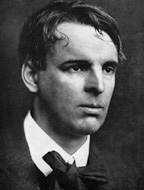Home
Catalog
African
Age of Reason
Alchemy
Americana
Ancient Near East
Asia
Atlantis
Australia
Basque
Baha'i
Bible
Buddhism
Celtic
Christianity
Classics
Confucianism
DNA
Earth Mysteries
Egyptian
England
Esoteric/Occult
Evil
Fortean
Freemasonry
Gothic
Gnosticism
Grimoires
Hinduism
I Ching
Islam
Icelandic
Jainism
Journals
Judaism
Legends/Sagas
Basque
Celtic
England
Icelandic
Roma
Morris
Yeats
LGBT
Miscellaneous
Mormonism
Native American
Necronomicon
New Thought
Neopaganism/Wicca
Nostradamus
Oahspe
Pacific
Paleolithic
Philosophy
Piri Re'is Map
Prophecy
Roma
Sacred Books of the East
Sacred Sexuality
Shakespeare
Shamanism
Shinto
Sikhism
Sub Rosa
Swedenborg
Sky Lore
Tantra
Taoism
Tarot
Thelema
Theosophy
Time
Tolkien
UFOs
Utopia
Women
Zoroastrianism

|
William Butler Yeats |
William Butler Yeats (born 1865, died 1939), a key figure in the Celtic literary revival at the turn of the 20th Century, also moved in occult circles and knew many of the key figures of the Golden Dawn. He served as a Senator of the Irish free state and won the Nobel prize for literature in 1923.
Note on copyrights: all of Yeats' books and other writings are copyrighted in the UK and EU because he died in 1939, since their current copyright term is death+70 years. Therefore they will be covered by copyright in the UK and EU until 2009. However, all of his writings prior to January 1st, 1923 are in the public domain in the United States by the terms of the Digital Millenium Copyright Act; since sacred-texts is hosted in the US we abide by this criteria. We have been careful only to use pre-1923 editions to produce these etexts. Please take this into consideration if you plan to republish or post these texts outside the US.
Later Poems
by W. B. Yeats [1922]
Fairy and Folk Tales of the Irish Peasantry
Edited and Selected by W. B. Yeats [1888]
Celtic Twilight
by W. B. Yeats [1902 edition]
This is a collection of essays by Yeats on supernatural Celtic themes.
In The Seven Woods
by W. B. Yeats [1903]
This is a short book of poetry and a play
by Yeats on Irish mythological themes.
Other Yeats Material at Sacred-texts
Preface to Cuchulain of Muirthemne, by Lady Gregory [1902]
Preface to Gods and Fighting Men, by Lady Gregory [1904]
Introduction to Gitanjali, by Rabindranath Tagore [1913]
Notes to Visions and Beliefs in the West of Ireland, by Lady Gregory [1920]